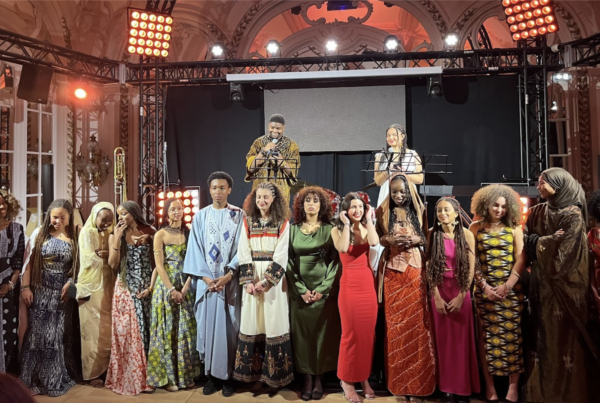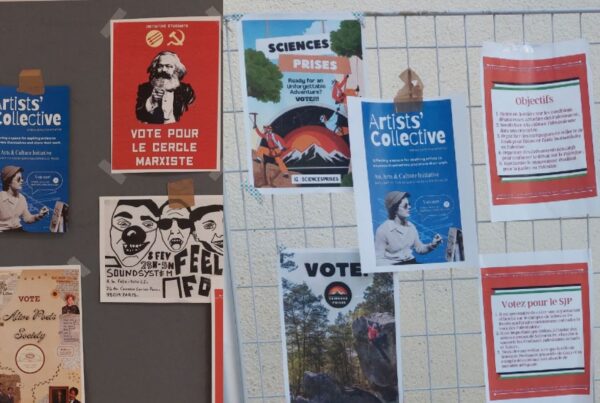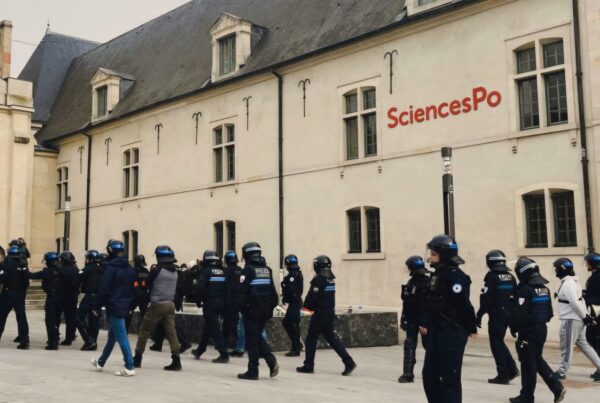
Amid the hundreds of varying student associations, Sciences Po is home to a rich opportunity: student initiatives. These are temporary projects seeking to establish themselves as legitimate organizations with similar resources to permanent associations. From entrepreneurship to mental health advocacy, the choices this year were far-reaching. Beginning September 30, over twenty projects were proposed by students during the initiative campaign week, a full five days of hosting parties, on-campus awareness stands, and boosting their social media presence. Students were then able to support up to three proposed initiatives between Wednesday, October 2 and Friday, October 4.
Now, as the dust settles from this intensive self-promotion, we are left wondering: do the winning projects follow similar past trends of student interest? Or do they reflect a broader phenomenon, a shift in what Sciences Po students value?
Among this semester’s chosen proposals, I identified three major umbrella themes that stand out: Civil and Political Engagement, Defense of Rights and Advocacy, and Art and Culture.
1. Civil and Political Engagement
Following the voting period, results announced October 10th showed that politics, education, and debate were the most popular themes. The vote resulted in the creation of four new projects: Cercle Boutmy, Sciences Portail Public (SPP), Socie’tea (La Socié’thé), and Sciences Paumé. Cercle Boutmy centers around embracing a new form of discussion, one of “collective intelligence” within a culture-of-compromise approach to politics through varying political workshops. Socie’tea is within this same realm. It hopes to provide a space to debate current social issues while diving into the history of tea and its relationship with colonization and environmental impacts. On the other hand, SPP is more training-based. It aims to act as a public service to bridge the gap between students and French, European, and international institutions. With a stronger cultural focus, Sciences Paumé seeks to bring awareness among the student body about the countryside and its relevance to bustling city and political life.
2. Advocacy and the Defense of Rights
The second most supported theme this semester is solidarity and the defense of rights, fields in which there were three new ventures: a Girl Up chapter, SP Textured, and Ben Évole. Originally founded by the United Nations Foundation, Girl Up focuses on empowering young adults. They aid with career development to equip students with the skills and tools necessary to promote gender justice in all realms. Meanwhile, SP Textured focuses on the fight against hair discrimination and on raising awareness about frequent microaggressions. With a more charity-work focus, the Ben Évole association acts as an intermediary between the solidarity associations in the Marne department and Sciences Po. UNICEF was also voted in for the second year in a row.
3. Art and Culture
The final category among this results week is art and culture, which saw the appearance of two new major initiatives: L’Artelier and Poézine. Both associations seek out students’ artistic inspirations, with the former promoting our campus community’s involvement in art history, and the latter seeking to act as a platform for writers and aspiring artists. Additionally, the Asians in Reims Association (AIRA) was once again voted as a student initiative.
Overall Reflection
Despite this last topic of interest, there is a clear preference among students for the major themes of advocacy and politics. Does this indicate a possible desire to learn more about the intricacies of policy-making and social justice, as well as becoming more involved within the field?
According to one student as part of an anonymous survey, “I supported Ben Évole and Girl up (sic), not only because I already liked the concept of charity-work (sic) experience and activism, but because the topics they act on are really present in my courses. They got me more interested in them and how I could get more involved.”
Another student justified their support for political engagement initiatives, saying, “I preferred Cercle Boutmy because it prioritizes compromise in politics which I think is necessary in today’s polarized communities, particularly in France.”
This support is also displayed by the difference between the number of projects supported within this theme and that of art and culture, the former having four more proposed initiatives than the latter. These are quite specific, particularly SP Textured and Sciences Paumé, suggesting there is a rising sentiment among students about shining light on issues that are traditionally overlooked.
This trend was also observed in last year’s campaigns. Last autumn, the most popular themes were advocacy, politics, and human rights, the initiatives of which were so numerous they can be split into three categories: debate and politics, education and training, and the defense of rights. Similarly, last spring’s most preferred topics concerned politics and civil engagement, with a particular interest in solidarity-based projects such as Oasis Solidaires Soutien Étudiant, which focused on creating spaces to welcome the elderly during heat waves, and Justice for Palestine. With past projects like sCpOMMEMORE promoting the need for the remembrance of genocides and violence throughout history, and Antenne Place Publique à Sciences Po fighting social and ecological emergencies, it is clear student interests in civic justice remain unwavering, despite this semester’s number of civic engagement actions being somewhat lower than last year. Their everlasting presence is especially seen by UNICEF’s win this fall. Its continued relevance in student priorities was explained by one surveyed student who stated, “Nothing can really be compared to it. There are associations that defend human rights and some others that help children, but never both combined.”
Conversely, the interest in leisure through art and culture has dropped since last autumn’s five initiatives where topics included card games in Dame Museux and British culture via Le Ros Bif. This decreasing trend can also be seen within this semester’s lack of demand for sport initiatives, of which last year there were three: Sciences Football, Sciences Sportives promoting women’s sport, and Sciences Hoopers, democratizing basketball culture.
This sentiment is shared by second-years. One who was surveyed said two out of their three top votes last year was for Borscht Loving Society, aimed at promoting Eastern European cultures, and Le Ros Bif. On the other hand, only five of several respondents to the previous survey said proposals like Purple Haze and Wonka, focused on music and culinary appreciation, were among their top selections.
Nevertheless, creative endeavors like L’Artelier reiterate that, “the interests of Sciences Po students are diverse and fall within a broad spectrum that goes from what is useful to what is pleasant”.
Other posts that may interest you:
- An Immersive Look into African Week 2025
- From Practice to Podium: A Look at the Heart of Competitive Debate
Discover more from The Sundial Press
Subscribe to get the latest posts sent to your email.




